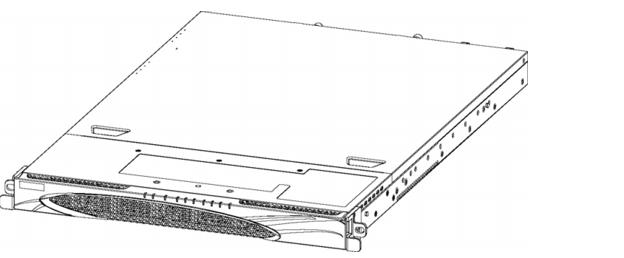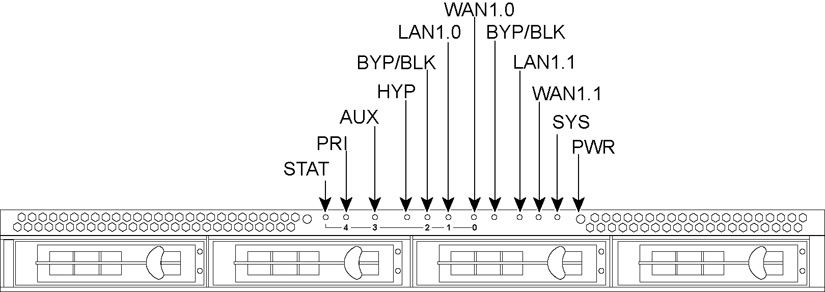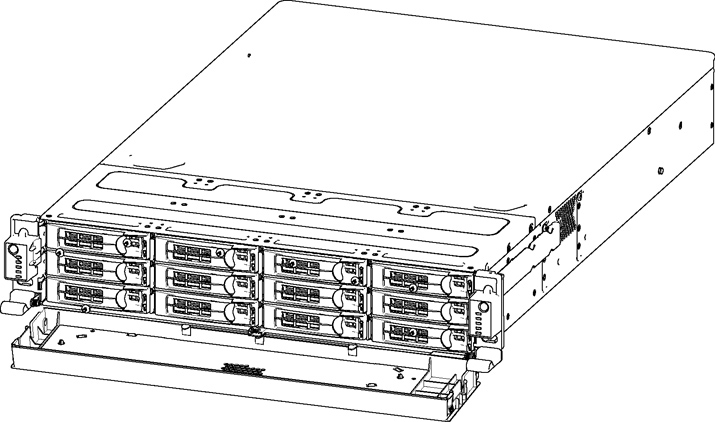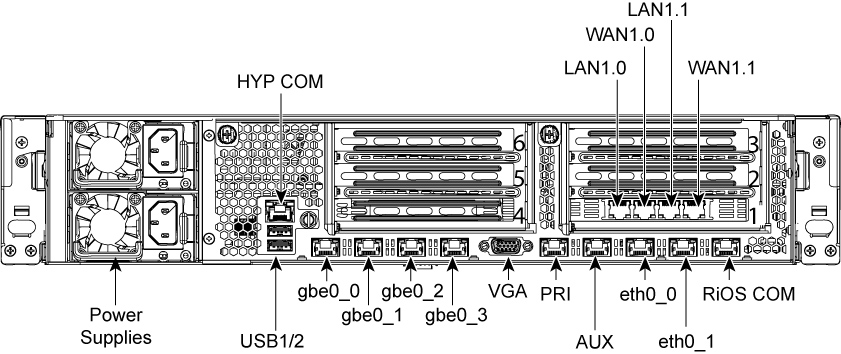SteelFusion Edge Overview
The SteelFusion Edge appliances contain two physical nodes per appliance, which provide true hardware resource separation and isolation. These two compute nodes, the RiOS node and the hypervisor node, are connected through Gigabit Ethernet interconnects that allow both nodes to communicate for management, networking, and storage data. Each node has its own resources with the exception that the hypervisor node does not contain storage resources other than hardware for the hypervisor boot device. Storage for the hypervisor node is provided from the RiOS node through the interconnects using iSCSI.
The SteelFusion Edge appliances are the virtual edge of the data center that allows end users in a branch to access and write to centralized storage over the WAN at local speeds. The SteelFusion Edge appliances consist of the following products:
• SteelFusion Edge 2100
• SteelFusion Edge 2200
• SteelFusion Edge 3100
• SteelFusion Edge 3200
• SteelFusion Edge 5100
This overview provides a description of the SteelFusion Edge appliances and includes the following sections:
1U SteelFusion Edge appliances
The SteelFusion Edge 2100 and SteelFusion Edge 2200 appliances are 1U appliances that can provide WAN optimization, BlockStream-enabled storage, and hypervisor functionality. (See
Figure: 1U SteelFusion Edge appliance (front view).) They support two independent nodes; each node has its own management and monitoring. The appliances have four disk drive slots that are numbered 0 to 3. (See
Figure: 1U SteelFusion Edge disk slot numbers (front view).) The appliances also support different combinations of network interface cards (NIC) that can be installed in the back of the appliance. (See
Figure: 1U SteelFusion Edge appliance port labels (back view).) Slot 0 on the back of the appliance ships with NIC-2-001G-4TX-BP installed and is used for RiOS functionality while slot 2 can support an additional NIC also to be used for RiOS or as a bypass card.
Figure: 1U SteelFusion Edge appliance (front view)

The disk slots are numbered 0 to 3 beginning at the left.
Figure: 1U SteelFusion Edge disk slot numbers (front view) shows the disk slot number scheme for the 1U SteelFusion Edge appliance.
Figure: 1U SteelFusion Edge disk slot numbers (front view)
Figure: 1U SteelFusion Edge appliance port labels (back view) shows the ports on the 1U SteelFusion Edge appliance. They are described in the following table.
Figure: 1U SteelFusion Edge appliance port labels (back view)

Port | Description |
HYP COM | HYP serial RJ45 COM port manages the hypervisor node. Serial settings: 9600 bps, 8 data bit, 1 stop bit, no parity. |
LAN1.0, WAN1.0, LAN1.1, WAN1.1 | Provides access to the 10/100/1000 Base-TX. • The LAN port connects the system to a LAN switch. • A WAN port connects the system to the WAN router. |
Power Supply | Supplies power to the appliance. |
USB 1, USB 2 | Optional USB ports for hypervisor connectivity. |
gbe0_0, gbe0_1, gbe0_2, gbe0_3 | 1 Gbps interfaces used for hypervisor connectivity. |
VGA | DB15 connector used for hypervisor video connectivity. |
PRI
(Primary) | The management interface that connects the SteelFusion Edge to a LAN switch. This management interface enables you to connect to the Management Console and the SteelFusion Edge CLI. The primary and auxiliary ports cannot share the same network subnet. |
AUX
(Auxiliary) | An optional port that provides an additional management interface for a secondary network. The primary and auxiliary ports cannot share the same network subnet. |
eth0_0, eth0_1 | Data interfaces that support the use of iSCSI, BlockStream heartbeat, and BlockStream sync. |
RiOS COM | RiOS serial RJ45 COM port manages the RiOS node. Serial setting: 9600 bps, 8 data bit, 1 stop bit, no parity. |
1U SteelFusion Edge LEDs
This section describes the ports and LEDs on the SteelFusion Edge 2100 and SteelFusion Edge 2200 appliances.
Figure: 1U SteelFusion Edge LEDs and buttons (front view) shows the front panel LED locations.
Figure: 1U SteelFusion Edge LEDs and buttons (front view)

The following tables summarize the system LEDs for the 1U SteelFusion Edge appliances.
Front panel LEDs and buttons | Status |
STAT (Status) | Button (not an LED) |
PRI (Primary) | Link and traffic = blinks blue |
AUX (Auxiliary) | Link and traffic = links blue |
HYP (Hypervisor) | Hypervisor power on = blue
Hypervisor power off = no light |
BYP/BLK
BYP (Bypass)
BLK = (Block) (Disconnect) | Normal = no light
Bypass or block (disconnect) = orange |
LAN1.0 LAN1.1 | Link and traffic = blinks blue |
WAN1.0 WAN1.1 | Link and traffic = blinks blue |
SYS (System) | Powering up = red
BIOS POST = orange
Normal = blue |
PWR (Power) | Button (not an LED) |
HDDs/SSDs | Disk connected = blue
Read/write activity = blinks blue
Failed disk = orange |
Back panel LEDs and buttons | Status |
HYP (hypervisor) | Activity = blinks |
gbe0_x ports | Left LED
Link = green
Activity = blinks green Right LED
GB = orange
100 MB = green
10 MB = no light |
PRI (Primary) | Left LED
Link = green
Activity = blinks green Right LED
GB = orange
100 MB = green
10 MB = no light |
AUX (Auxiliary) | Left LED
Link = green
Activity = blinks green Right LED
GB = orange
100 MB = green
10 MB = no light |
LAN-WAN | Left LED
Link = green
Activity = blinks green Right LED
GB = orange
100 MB = green
10 MB = no light BYP/BLK
Normal = no light
Bypass or block (disconnect) = orange |
eth0_x ports | Left LED
Link = green
Activity = blinks green Right LED
GB = orange
100 MB = green
10 MB = no light |
RiOS | Activity = blinks |
2U SteelFusion Edge appliances
The SteelFusion Edge 3100, SteelFusion Edge 3200, and SteelFusion Edge 5100 are 2U appliances that can provide WAN optimization, BlockStream-enabled storage, and hypervisor functionality. (See
Figure: 2U SteelFusion Edge appliance (front view).) They support two independent nodes with its own management and monitoring. The appliances have 12 disk drive slots that are numbered 0 to 11. (See
Figure: 2U SteelFusion Edge disk slot numbers (front view).) The appliances also support different combinations of network interface cards (NIC) that can be installed in the back of the appliance. (See
Figure: 2U SteelFusion Edge appliance port labels (back view).) Slots 1 to 4 are reserved for RiOS functionality while slots 5 and 6 are reserved for the hypervisor (HYP). Slot 1 ships with the NIC-2-001G-4TX-EXP-BP already installed and is used for RiOS functionality. The SteelFusion Edge is managed through the primary and auxiliary interfaces using VMware tools, such as the vSphere Client and vCenter.
Figure: 2U SteelFusion Edge appliance (front view)

The disk slots are numbered 0 to 11 beginning at the top left.
Figure: 2U SteelFusion Edge disk slot numbers (front view) shows the disk slot number scheme for the 2U SteelFusion Edge appliance.
Figure: 2U SteelFusion Edge disk slot numbers (front view)
Figure: 2U SteelFusion Edge appliance port labels (back view) shows the port labels on the 2U SteelFusion Edge appliance. They are described in the following table.
Figure: 2U SteelFusion Edge appliance port labels (back view)
Port | Description |
HYP COM | HYP serial RJ45 COM port manages the hypervisor node. Serial settings: 9600 bps, 8 data bit, 1 stop bit, no parity. |
LAN1.0, WAN1.0, LAN1.1, WAN1.1 | Provides access to the 10/100/1000 Base-TX. • The LAN port connects the system to a LAN switch. • A WAN port connects the system to the WAN router. |
Power Supply | Supplies power to the appliance. |
USB 1, USB 2 | Optional USB ports for hypervisor connectivity. |
gbe0_0, gbe0_1, gbe0_2, gbe0_3 | 1 Gbps interfaces used for hypervisor connectivity. |
VGA | DB15 connector used for hypervisor video connectivity. |
PRI
(Primary) | The management interface that connects the SteelFusion Edge to a LAN switch. This management interface enables you to connect to the Management Console and the SteelFusion Edge CLI. The primary and auxiliary ports cannot share the same network subnet. |
AUX
(Auxiliary) | An optional port that provides an additional management interface for a secondary network. The primary and auxiliary ports cannot share the same network subnet. |
eth0_0, eth0_1 | Data interfaces that support the use of iSCSI, BlockStream heartbeat, and BlockStream sync. |
RiOS COM | RiOS serial RJ45 COM port manages the RiOS node. Serial setting: 9600 bps, 8 data bit, 1 stop bit, no parity. |
2U SteelFusion Edge LEDs
This section describes the ports and LEDs for the SteelFusion Edge 3100, SteelFusion Edge 3200, and SteelFusion Edge 5100 appliances.
Figure: 2U SteelFusion Edge LEDs (front view) shows the LEDs for the 2U SteelFusion Edge appliances.
Figure: 2U SteelFusion Edge LEDs (front view)
The following table summarizes the LEDs and buttons.
LEDs and buttons | Status |
STAT (Status) | Button (not an LED) |
PRI (Primary) | Link and traffic = blinks blue |
AUX (Auxiliary) | Link and traffic = blinks blue |
BYP/BLK
BYP (Bypass)
BLK = (Block) (Disconnect) | Normal = no light
Bypass or block (disconnect) = solid orange |
LAN | Link and traffic = blinks blue |
WAN | Link and traffic = blinks blue |
PWR (Power) | Button (not an LED) |
SYS (System) | Powering up = solid red
BIOS POST = solid orange
Normal = blue |
HYP (Hypervisor) | Hypervisor on = solid blue
Hypervisor off = no light |
Field Replaceable Units
The SteelFusion Edge appliances contain several units that you or a certified service technician can troubleshoot, remove from the system, and replace without having to send the system to a repair facility.
Note: Perform troubleshooting or repairs only as directed in the product documentation or by the online or telephone service and support team. All other servicing should be performed by a certified service technician only. Your warranty does not cover damage due to servicing that is not authorized by Riverbed. Read and follow the safety instructions in the Safety and Compliance Guide.
For more information and a list the FRUs available for SteelFusion Edge appliances, see
Replacing SteelFusion Edge Components. 








